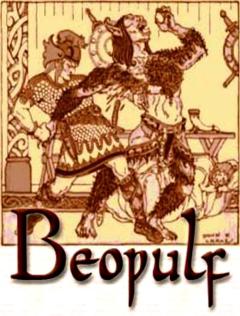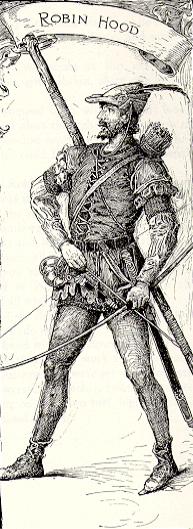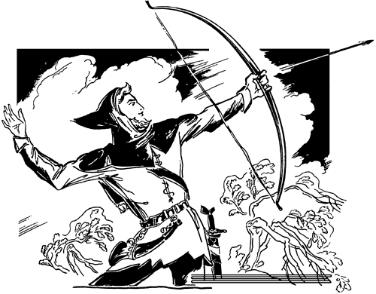
Английская поэзия XIV–XX веков
..pdf
Поэзия – высшая форма бытия национального языка. В поэтическом творчестве с наибольшей полнотой и концентрированностью выражается дух народа – своеобразие его исторического и культурного развития, его психического строя. Понять поэзию другого народа – значит понять другой национальный характер, эмоциональный мир другой культуры.
Е.Г. Эткинд
The Birth of English Literature
In the late 6th and early 7th centuries when Christianity came to British Isles, everything was in Latin as the more “learned” language. But for our general knowledge of early English literature we have to thank the Viking pirates of the 9th century. They robbed Anglo-Saxon monasteries, and Latin learning declined. So King Alfred the Great decided to promote writing and education in English.
Several collections of excellent poetry survived. Some of them are Christian in content, but others present a mixture of Christian and pagan ideas. From this poetry, we know that even seemingly Christian Anglo-Saxons were often warlike and preferred gold, feasts and heroic actions rather than prayers.
The most brilliant (and the most complete) piece of such poetry is the epic poem “Beowulf” telling the story of a hero who fought monsters. But the story is not about Anglo-Saxons – it takes place in Denmark and Sweden. This might be due to the fact that some of the newcomers to Britain – Jutes, most notably – were of Scandinavian origin.
The language of the Anglo-Saxon records is now called Old English. Technically, it is the language spoken between the 5th and 11th centuries AD (until the Norman invasion 1066). Today, it is very difficult to read even for an English person. So most people read Old English poetry in modern translations – like the one you see below.
Beowulf
Not much Anglo-Saxon poetry of the pagan period has come down to us. By far the most important remaining example is the epic “Beowulf”, of about three thousand lines. This poem may have been carried to England in the form of ballads by the Anglo-Saxons; or it may be Scandinavian material, later brought in by Danish or Norwegian pirates. At any rate it seems to have taken on its present form in England during the seventh and eighth centuries. It relates, with the usual terse and unadorned power of really primitive poetry, how the hero Beowulf, coming over the sea to the relief of King Hrothgar, delivers him from a monster, Grendel, and then from the vengeance of Grendel's only less formidable mother. Returned home in triumph, Beowulf much later receives the due reward of his valor by being made king of his own tribe, and meets his death while killing a fire – breathing dragon which has become a scourge to his people.
11

From BEOWULF
Beowulf kills a horrible man-eating troll called Grendel, yet has to face the even more terrible female monster who is Grendel’s mother. Translation from Old English by Marijane Osborn.
Then by the shoulder Beowulf seized Grendel's mother – the Geat was now furious, and had few qualms about fighting –
and swung her, hard, so she smashed to the floor! Promptly she paid him back for that pass, closing upon him with a clammy embrace,
and, weary, that strongest of warriors stumbled; catching his foot, he went crashing down.
She straddled her hall-guest and drew her sax, a gleaming knife; she wanted to get vengeance for her child. But on his chest
lay the woven sark; that saved his life
with iron rings that blunted both point and blade. Edgetheow's son would have ended his days there under the pool, the prince would have perished,
except he was helped by his woven sark, that hard net of war – and by holy God, who brought him victory in that battle.
The Ruler of the Skies decided it rightly, with ease, when Beowulf stood up again.
He saw before him a fabulous blade among other armor, an ancient sword
worthy of a warrior, the choicest of weapons – except it was mightier than any other man could bear into battle but Beowulf,
heavy and ornate, the handwork of giants. The daring champion of the Shieldings dived for that radiant hilt, raised it high, despairing of his life, lunged angrily,
slashing down hard through the skin of her neck, breaking the vertebrae, the blade vanishing through her. Fated, she fell to the floor.
The warrior rejoiced, lifting his weapon.
Из Беовульфа
Беовульф убивает тролля-людоеда Гренделя, но ему предстоит встретиться с не менее ужасным монстром – матерью Гренделя.
Перевод с древнеанглийского В. Тихомирова
Не устрашился гаутский витязь: схватил за плечи родитель Гренделя и, гневом кипящий, швырнул врагиню, тварь смертоносную метнул на землю; она ж немедля ему ответила:
в него кровавыми впилась когтями
итут, уставший, он оступился, муж могучий, он рухнул наземь. Уже, пришельцу на грудь усевшись, она готовилась ножом широким воздать за сына; но были доспехом покрыты прочным плечи героя, была кольчуга ножу преградой,
исгинул бы воин, потомок Эгтеова, вождь гаутский, в водной пучине, когда б не спасла его сбруя ратная, сеть боевая, когда б Всевышний Правитель Славы, его покинул; но Бог справедливо судил – и витязь
воспрянул, ратник сильный, как прежде. Тогда он увидел среди сокровищ орудие славное, меч победный, во многих битвах он был испытан,
клинок – наследие древних гигантов; несоразмерный, он был для смертного излишне тяжек в игре сражений, но ухватился герой за черен,
посланец Скильдинга, страха не знающий, сплеча ударил и снес ей голову, –
шею рассекши, разбив хребтину, пронзило лезвие плоть зломерзостную; тварь издохла; клинок окровавился; герой возрадовался!
12

Folk Ballads of Robin Hood
In the 15th century folk poetry flourished in England and Scotland. The best of folk poetry were the ballads – narratives in verse, partly lyrical, partly epic. There were various kinds of ballads: historical, legendary, lyrical and humorous. They became so popular that the names of their authors were forgotten.
The ballads were handed down by word of mouth from generation to generation. The most popular ones were those about Robin Hood – partly legendary, partly historical character.
Robin Hood is a heroic outlaw in English folklore, and was also a highly skilled archer and swordsman. Although such behaviour was not part of his original character, since the beginning of the 19th century he has become known for “robbing from the rich and giving to the poor”, assisted by a group of fellow outlaws known as his “Merry Men”. Traditionally, Robin Hood and his men are depicted wearing Lincoln green clothes.
In the earliest sources, Robin Hood is a yeoman, but he was often later portrayed as an aristocrat wrongfully dispossessed of his lands and made into an outlaw by an unscrupulous sheriff. He lived in about the second half of 12th century, in the times of King Henry II and his son Richard the Lion Heart. In those days many of the big castles belonged to robber-barons, who ill-treated the people, stole children and took away the cattle and corn of the villeins.
If the country-folk resisted, they were either killed by the barons or driven away, and their homes were destroyed. They had no choice but to go out in bands and hide in the woods; then they were declared “outlaws” (outside the protection of the law).
The 19th century ballad scholar Francis Child collected 38 separate Robin Hood ballads in his ballad collection – as well as a
few other ballads which featured Robin Hood in some versions but not in others. Composed over hundreds of years, these ballads form the Robin Hood legend. Scenes from these tales have been used in many novels, movies and television shows.
Some ballads have been adapted in modern English. The numbers are those assigned by the great 19th century scholar Francis Child in his multi-volume collection “The English and Scottish Popular Ballads” (the volume with the Robin Hood ballads appeared in 1888).
13

Ballad
1
Robin Hood hee was and a tall young man, Derry derry down
And fifteen winters old,
And Robin Hood he was a proper young man, Of courage stout and bold.
Hey down derry derry down. 2
Robin Hood he would and to fair Nottingham, With the general for to dine;
There was he ware of fifteen forresters, And a drinking bear, ale, and wine.
3
“What news? What news?” said bold Robin Hood; “What news, fain wouldest thou know?”
“Our king hath provided a shooting-match”: “And I'm ready with my bow”.
4
“We hold it in scorn”, then said the forresters, “That ever a boy so young
Should bear a bow before our king, That's not able to draw one string”. 5
“I'le hold you twenty marks”, said bold Robin Hood, “By the leave of Our Lady,
That I'le hit a mark a hundred rod, And I'le cause a hart to dye”.
6
“We'l hold you twenty mark”, then said the forresters, “By the leave of Our Lady,
Thou hitst not the marke a hundred rod, Nor causest a hart to dye”.
7
Robin Hood he bent up a noble bow, And a broad arrow he let flye,
He hit the mark a hundred rod, And he causest a hart to dye. 8
Some said hee brake ribs one or two, And some said hee brake three;
The arrow within the hart would not abide, But it glanced in two or three.
9
The hart did skip, and the hart did leap, And the hart lay on the ground,
“The wager is mine”, said bold Robin Hood, “If 't were for a thousand pound”.
10
“The wager's none of thine”, then said the forresters, “Although thou beest in haste;
14

Take up thy bow, and get thee hence, Lest wee thy sides do baste”.
11
Robin Hood he took up his noble bow, And his broad arrows all amain,
And Robin Hood he laught, and begun to smile, As hee went over the plain.
12
Then Robin Hood hee bent his noble bow, And his broad arrows he let flye,
Till fourteen of these fifteen forresters Upon the ground did lye.
13
He that did this quarrel first begin Went tripping over the plain,
But Robin Hood he bent his noble bow, And hee fetcht him back again.
14
“You said I was no archer”, said Robin Hood, “But say so now again”;
With that he sent another arrow That split his head in twain.
15
“You have found mee an archer”, saith Robin Hood, “Which will make your wives to wring,
And wish that you had never spoke the word, That I could not draw one string”.
16
The people that lived in fair Nottingham Came runing out amain,
Supposing to have taken bold Robin Hood, With the forresters that were slain.
17
Some lost legs, and some lost arms, And some did lose their blood,
But Robin Hood hee took up his noble bow, And is gone to the merry green wood.
18
They carryed these forresters into fair Nottingham, As many there did know;
They digd them graves in their church-yard, And they buried them all a row.
15

Балладный цикл о Робин Гуде насчитывает более четырех десятков баллад, повествующих о различных приключениях героя и его товарищей.
Точное время возникновения баллад о Робин Гуде трудно установить; предположительно они восходят к XI веку, ко времени завоевания Англии нормандскими рыцарями. В этих легендах отразилась борьба против чужеземных нормандских феодалов, которые, по словам английского историка XII века Вильяма Мэльмсберийского (ок. 1080 – ок. 1143), «считали всё для себя дозволенным, проливали по прихоти кровь, вырывали у бедняка кусок хлеба изо рта, забирали всё: деньги, имущество, землю...».
Позднее крестьянская война Уолта Тайлора (1381) вызвала появление новых баллад о Робин Гуде. Самые поздние варианты – XV века.
Согласно легенде Робин Гуд жил со своей «веселой ватагой» в Шервудском лесу. Главными его врагами были ноттингамский шериф, жестоко притеснявший народ, и монахи.
«Народные баллады, – писал А.М. Горький, – рисуют Робин Гуда неутомимым врагом угнетателей – норманнов, любимцем поселян, защитником бедняков, человеком, близким всякому, кто нуждался в его помощи. И в благодарность за это поэтическое чувство народа сделало из простого, может быть, разбойника героя, почти равного святому» (предисловие к сборнику «Баллады о Робин Гуде», Петербург, 1919).
С. Маршак «Три баллады о Робин Гуде»
Рождение Робин Гуда. Впервые под названием «Робин Гуд» с первой строкой «Был Вилли статным молодцом...» перевод появился в сборнике «Избранные переводы» (1946). Готовя к печати второй том сборника «Стихи, сказки, переводы» (1952), С. Маршак внес значительную стилистическую правку текста перевода.
Согласно одним легендам Робин Гуд был по происхождению йоменом (вольным крестьянином); согласно другим – знатным дворянином. В варианте баллады, переведенном С. Маршаком, его мать – дочь графа.
Робин Гуд и мясники. Упоминаемый в балладе Маленький Джон – непременный персонаж английских баллад о Робин Гуде, его первый помощник. Прозвище ироническое, так как, по преданию, Маленький Джон был очень высокого роста (семи футов).
Робин Гуд и шериф. С. Маршак перевел эту балладу в 1914–1915 годах; сохранился автограф первой половины перевода баллады, сильно отличающегося от нового перевода 1945–1946 годов. (Печатается по сборнику «Избранные переводы», 1959).
16

Willie And Earl Richard’s Daughter
O Willie 's large о limb and lith, And come о high degree,
And he is gane to Earl Richard, To serve for meat and fee.
Earl Richard had but ae daughter, Fair as a lily-flower,
And they made up their love-contract Like proper paramour.
It fell upon a simmer's nicht,
Whan the leaves were fair and green, That Willie met his gay ladie
Intil the wood alane.
“O narrow is my gown, Willie, That wont to be sae wide; And gane is a' my fair colour, That wont to be my pride”.
“But gin my father should get word What's past between us twa, Before that he should eat or drink”, He 'd hang you oer that wa.
“But ye'll come to my bower, Willie, Just as the sun gaes down,
And kep me in your arms twa, And latna me fa down”.
O whan the sun was now gane down, He 's doen him till her bower,
And there, by the lee licht о the moon, Her window she lookit oer.
Intill a robe о red scarlet She lap, fearless о harm;
And Willie was large о lith and limb, And keppit her in his arm.
And they 've gane to the gude green wood, And, ere the night was deen,
She 's born to him a bonny young son, Amang the leaves sae green.
Whan night was gane, and day was come, And the sun began to peep,
Up and raise the Earl Richard Out о his drowsy sleep.
Рождение Робин Гуда
Он был пригожим молодцом, Когда служить пошел Пажом усердным в графский дом За деньги и за стол.
Ему приглянулась хозяйская дочь, Надежда и гордость отца, И тайною клятвой они поклялись Друг друга любить до конца.
Однажды летнею порой, Когда раскрылся лист, Шел у влюбленных разговор Под соловьиный свист.
– О Вилли, тесен мой наряд, Что прежде был широк, И вянет-вянет нежный цвет Моих румяных щек.
Когда узнает мой отец, Что пояс тесен мне, Меня запрет он, а тебя Повесит на стене.
Ты завтра к окну моему приходи Украдкой на склоне дня.
К тебе с карниза я спущусь, А ты поймай меня!
Вот солнце встало и зашло, И ждет он под окном С той стороны, где свет луны Не озаряет дом.
Открыла девушка окно, Ступила на карниз И с высоты на красный плащ К нему слетела вниз.
Зеленая чаща приют им дала, И прежде чем кончилась ночь, Прекрасного сына в лесу родила Под звездами графская дочь.
В тумане утро занялось Над зеленью дубрав, Когда от тягостного сна Очнулся старый граф.
17

He's ca'd upon his merry young men, By ane, by twa, and by three:
“O what's come о my daughter dear, That she 's пае come to me?”
“I dreamt a dreary dream last night, God grant it come to gude!
I dreamt I saw my daughter dear Drown in the saut sea flood”.
“But gin my daughter be dead or sick, Or yet be stown awa,
I mak a vow, and I'll keep it true, I'll hang ye ane and a'!”
They sought her back, they sought her fore, They sought her up and down;
They got her in the gude green wood, Nursing her bonny young son.
He took the bonny boy in his arms, And kist him tenderlie;
Says, Though I would your father hang, Your mother 's dear to me.
He last him oer and oer again: “My grandson I thee claim,
And Robin Hood in gude green wood, And that shall be your name”.
And mony ane sings о grass, о grass, And mony ane sings о corn,
And mony ane sings о Robin Hood Kens little whare he was born.
It wasna in the ha, the ha, Nor in the painted bower,
But it was in the gude green wood, Amang the lily-flower.
Идет будить он верных слуг В рассветной тишине.
– Где дочь моя и почему Не поднялась ко мне?
Тревожно спал я в эту ночь И видел сон такой: Бедняжку-дочь уносит прочь Соленый вал морской.
В лесу густом, на дне морском Или в степном краю Должны вы мертвой иль живой Найти мне дочь мою!
Искали они и ночи и дни, Не зная покоя и сна,
И вот очутились в дремучем лесу, Где сына качала она. «Баюшки-бáю, мой милый сынок, В чаще зеленой усни.
Если бездомным ты будешь, сынок, Мать и отца не вини!»
Спящего мальчика поднял старик И ласково стал целовать.
– Я рад бы повесить отца твоего, Но жаль твою бедную мать.
Из чащи домой я тебя принесу, И пусть тебя люди зовут По имени птицы, живущей в лесу,
Пусть так и зовут: Робин Гуд!
Иные поют о зеленой траве, Другие – про белый лен.
А третьи поют про тебя, Робин Гуд, Не ведая, где ты рожден.
Не в отчем дому, не в родном терему, Не в горницах цветных, – В лесу родился Робин Гуд Под щебет птиц лесных.
|
|
|
|
|
|
||
|
|
|
|
|
Робин Гуд и мясники |
|
|
|
|
Robin Hood and Butchers |
|
|
|
|
|
|
|
1 |
|
|
|
|
|
|
|
Come, all you brave gallants, |
|
Спешите на улицу, добрые люди, |
|
|
|
|
|
and listen a while, |
|
Послушайте песню мою. |
|
|
|
|
|
With hey down, down an a down |
|
О славном стрелке, удалом Робин Гуде, |
|
|
|
|
|
That are in the bowers within; |
|
Для вас я сегодня спою. |
|
|
|
|
|
For of Robin Hood, that archer good, |
|
|
|
|
|
|
|
A song I intend to sing. |
|
|
|
|
|
18

|
|
|
|
|
|
2 |
|
|
|
|
Upon a time it chanced so |
В лесу на рассвете гулял Робин Гуд. |
|
|
|
Bold Robin in forrest did spy |
Вдруг слышит он топот копыт. |
|
|
|
A jolly butcher, with a bony fine mare, |
Мясник молодой на лошадке гнедой |
|
|
|
With his flesh to the market did hye. |
На рынок рысцою трусит. |
|
|
|
3 |
|
|
|
|
“Good morrow, good fellow”, said jolly Robin, |
– Скажи, молодец, – говоритРобинГуд, – |
|
|
|
“What food hast? tell unto me; |
В какой ты живешь стороне |
|
|
|
And thy trade to me tell, and where thou dost dwell, |
И что за товар ты везешь на базар? |
|
|
|
For I like well thy company”. |
Ты больно понравился мне. |
|
|
|
4 |
|
|
|
|
The butcher he answered jolly Robin: |
– Мненекогда, сударь, рассказыватьвам, |
|
|
|
No matter where I dwell; |
В какой я живу стороне, |
|
|
|
For a butcher I am, and to Notingham |
А мясо на рынок везу в Ноттингам |
|
|
|
I am going, my flesh to sell. |
Продать там по сходной цене. |
|
|
|
5 |
|
|
|
|
“What is [the price] of thy flesh?” said jolly Robin, |
– Послушай-ка, парень, – сказалРобинГуд, |
|
|
|
“Come, tell it soon unto me; |
А сколько возьмешь ты с меня |
|
|
|
And the price of thy mare, be she never so dear, |
За все целиком: за мясо с мешком, |
|
|
|
For a butcher fain would I be”. |
Уздечку, седло и коня? |
|
|
|
6 |
|
|
|
|
“The price of my flesh”, the butcher repli'd, |
– Немного возьму, – отвечает мясник, – |
|
|
|
“I soon will tell unto thee, |
Чтоб в город товар не везти. |
|
|
|
With my bonny mare, and they are not dear, |
За мясо с мешком и коня с ремешком |
|
|
|
Four mark thou must give unto me”. |
Пять марок ты мне заплати. |
|
|
|
7 |
|
|
|
|
“Four mark I will give thee”, saith jolly Robin, |
– Бери свои деньги, – сказал Робин Гуд, – |
|
|
|
“Four mark it hall be thy fee; |
Бери заодно с кошельком |
|
|
|
Thy mony come count, and let me mount, |
И пей за меня, чтобы с этого дня |
|
|
|
For a butcher I fain would be”. |
Счастливым я стал мясником! |
|
|
|
8 |
Верхом прискакал Робин Гуд в |
|
|
|
Now Robin he is to Notingham gone, |
Ноттингам, |
|
|
|
His butcher's trade to begin; |
Проехал у всех на виду, |
|
|
|
With good intent, to the sheriff he went, |
К шерифу пошел – и деньги на стол |
|
|
|
And there he took up his inn. |
За место в торговом ряду. |
|
|
|
9 |
|
|
|
|
When other butchers they opened their meat, |
С другими купцами он сел торговать, |
|
|
|
Bold Robin he then begun; |
Хоть с делом он не был знаком, |
|
|
|
But how for to sell he knew not well, |
Не знал, какпродать, обмануть, недодать. |
|
|
|
For a butcher he was but young. |
Он был мясником-новичком. |
|
|
|
10 |
|
|
|
|
'When other butchers no meat could sell, |
Но шибко торговля пошла у него. |
|
|
|
Robin got both gold and fee; |
Что хочешь плати – и бери! |
|
|
|
For he sold more meat for one peny |
За пенни свинины он больше давал, |
|
|
|
Than others could do for three. |
Чем все остальные за три. |
|
|
|
11 |
|
|
|
|
But when he sold his meat so fast, |
Он только и знал – зазывал, продавал, |
|
|
|
No butcher by him could thrive; |
Едва успевал отпускать. |
|
|
|
For he sold more meat for one peny |
Он больше говядины продал за час, |
|
|
|
Than others could do for five. |
Чем все остальные за пять. |
|
|
|
|
|
|
|
19

12
Which made the butchers of Notingham To study as they did stand,
Saying, surely he was some prodigal, That had sold his father's land.
13
The butchers they stepped to jolly Robin, Acquainted with him for to be;
“Come, brother”, one said, “we all be of one trade, Come, will you go dine with me?”
14
“Accurst of his heart”, said jolly Robin, “That a butcher both deny;
I will go with you, my brethren true, And as fast as I can hie”.
15
But when to the sheriff's house they came, To dinner they hied apace,
And Robin he the man must be Before them all to say grace. 16
“Pray God bless us all”, said jolly Robin, “And our meat within this place;
A cup of sack so good will nourish our blood, And so I do end my grace”.
17
“Come fill us more wine”, said jolly Robin, “Let us merry be while we do stay;
For wine and good cheer, be it never so dear, I vow I the reckning will pay”.
18
“Come, brother[s], be merry”, said jolly Robin, “Let us drink, and never give ore;
For the shot I will pay, ere I go my way, If it cost me five pounds and more”.
19
“This is a mad blade”, the butchers then said; Saies the sheriff, He is some prodigal,
That some land has sold, for silver and gold, And now he doth mean to spend all.
20
“Hast thou any horn-beasts”, the sheriff repli'd, “Good fellow, to sell unto me?”
“Yes, that I have, good Master Sheriff, I have hundreds two or three”.
21
“And a hundred aker of good free land, If you please it to see;
And I'le make you as good assurance of it As ever my father made me”.
– Дворянский сынок, – мясники говорят, – В убыток себе продает.
Он, видно, отца разорит до конца, Бездельник, повеса и мот!
Подходят знакомиться с ним мясники.
– Послушай, собрат и сосед, На рынке одном мы товар продаем. Должны разделить и обед.
– Мы все мясники, – отвечал Робин Гуд, – Одна небольшая семья.
Сочту я за честь попить и поесть И чокнуться с вами, друзья!
Толпою к шерифу пришли они в дом, Садятся обедать за стол.
–Амладшийнашбрат, – мясникиговорят, – Молитву за нас бы прочел.
–Помилуйнас, боже, – сказал РобинГуд, Дай хлеб нам насущный вкусить И выпить винца, чтоб согрелись сердца! Мне не о чем больше просить.
–А ну-ка, хозяйка, – сказал Робин Гуд, – Друзей угостить я хочу.
Давай нам вина, и по счету сполна За всех я один заплачу.
–Вы пейте и ешьте, – сказал Робин Гуд, – Пируйте весь день напролет.
Не все ли равно, что стоит вино! Беру на себя я расчет.
–Дворянский сынок! – говорят мясники,
–Он продал именье отца
И весь свой доход за будущий год Решил промотать до конца.
–Давноль, – говоритРобинГудушериф, – Ты в наши приехал места?
Как жив и здоров и много ль голов Рогатого держишь скота?
–Рогатого много держу я скота –
Две сотни голов или три, – А впрочем, наведайся в наши места И сам на него посмотри.
Пасется мой скот по лесам, по лугам, Телята сейчас у коров.
20
